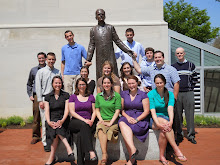Wednesday, January 14, 2015
What does it mean that marriage is indissoluble, Part II
Time for the Family
1/14/2015
Divorce
,
Family
,
Fruitfulness
,
Indissolubility
,
Marriage
,
RColeman
No comments
:
As
mentioned in Part I of this article, we
are exploring the concept of what is meant by “indissolubility” with regard to
marriage, occasioned by the attention surrounding it following the 2014
Extraordinary Synod on the Family. We continue here.
We
had to go into freedom and the vows before getting into indissolubility,
because not only do we need to understand that this is not extrinsic to human
nature, but also what is at stake in the Church’s upholding of this doctrine:
what the Church is preserving when she declares marriage’s indissolubility is
the ability of the human being to give himself forever. But this “forever” is
not simply held in each spouse’s hands, subject to the follies of human nature—rather,
the “forever” said by each of the spouses is a reality in itself that is both
in each of the spouses, but also beyond each of the spouses, not sustained by
shifting moods, emotions, or phases. The “forever” is held in the marriage bond
itself, a third thing, which both generates and is generated by the freely
chosen relationship of the spouses. What I mean to say here is that the
marriage bond is not simply a moral or contractual reality, with each party
meeting the other 50% of the way; by “third thing” I mean that the marriage
bond is a substance in itself (invisible, though no less real). It is, so to
speak, a 100% in itself, generated by the 100% of both of the spouse’s selves.
In this case, 100% does not equal 50%+50%; the equation actually looks more
like this: 1+1=1.
 |
| David Amsler, "Happy Family" is licensed under CC. by 2.0 |
This
is one of the reasons we say that a man and a woman “enter into” marriage: the
form, somewhat mysteriously, precedes them and calls them to marriage itself,
even while their freedom is perfectly respected. In fact it answers a deep
desire included in our freedom—to give oneself away, and by doing so, create
something new.
Thus,
we see that if the marriage bond is a “third thing,” if the bond itself has a
reality outside of the spouses’ persons, it cannot simply be destroyed because
one or both of the spouses decides they no longer desire the relationship. The
relationship, in the form of the marriage bond, which is given reality by the
vows, now exists separate from the spouses from the moment they exchange their
marriage vows. The handing of oneself over to another body and soul is so
radical and powerful that when two people do it in the form of the vows, it
generates an entirely new reality! This is what I mean when I wrote in the
first part of this article that the Church cannot
grant divorces because divorce does not truly exist. The
Church knows and trusts human nature and freedom so profoundly that she
recognizes its ability to say “forever” and generate an entirely third reality,
different from each of the spouses. A marriage is indissoluble because it has
an existence beyond the Church’s ability to grant or deny: it is not a
permission the Church gives but rather an existence she recognizes and upholds.
She knows and has always known that marriage is thus supernaturally-natural—marriage
is a sacrament, but one which has existed from “the beginning,” as it were (see
on this point Eph 5, and Mt 19).
Should
this “third” quality really be all that surprising to us? We see it all the
time in another, analogical form: children. We know that the conjugal act,
which is proper to marriage, bears out this “third” quality in a material way,
bringing new human persons to being. Children are both generated by each
parent, and yet entirely different beings, apart from their parents. Their
existence is indissoluble, and their reality both mirrors and helps to explain
the indissolubility of the marriage bond. Both children and the marriage bond
are a third generated by, but truly apart from, the spouses, holding each of
their “forevers,” well, forever.
And
so I return again to the supernaturally-natural quality of marriage, and its
indissoluble bond: what is more mysterious than the capacity of our freedom, of
our very selves, to create something other than ourselves? It is a gift that
was bestowed on human nature from the beginning, and a gift that the Church
upholds and for which she cares. What indissolubility shows us and protects,
therefore, is the capacity for human persons to reach beyond the confines of
their limited being and affect the world with their action and freedom forever.
Subscribe to:
Post Comments
(
Atom
)
















No comments :
Post a Comment
We would love to hear from you! Please keep comments respectful and relevant to the topic at hand.